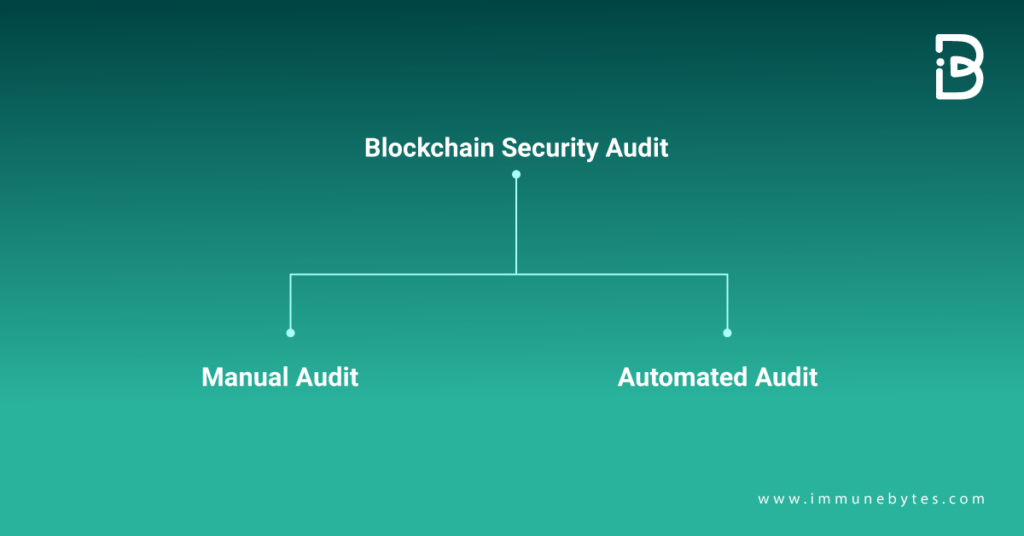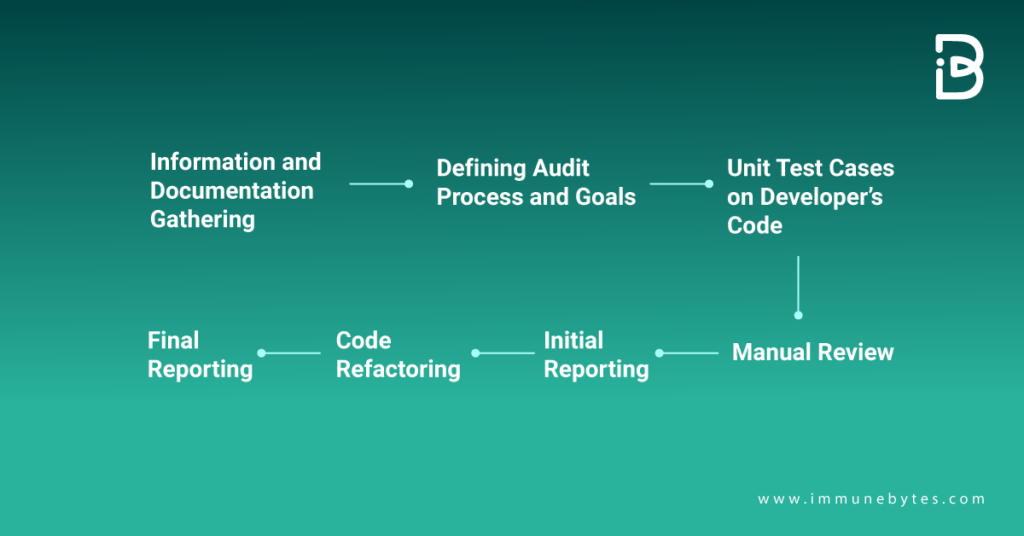Blockchain security audits are the ultimate safeguard for ensuring the safe deployment of projects on the blockchain. Learn about blockchain security audits, their importance, process, pros and cons, and smart contract security audits.
Blockchain technology has become the talk of the industry in recent years. As a foundational technology, it encompasses not only cryptocurrencies, which it initially started with but also a broad range of other use cases.
However, the rising acceptance of blockchain in varied spheres does not imply it is free from flaws. Although the technology’s immutability supports security, applications built over it are still prone to attacks, challenging its reliability.
This blog will discuss diverse domains related to the security aspect of the blockchain revolving around the blockchain security audit.
What is a Blockchain Security Audit?
Table of Contents
As the cornerstone of the cryptocurrency industry, blockchain technology is an undeniably powerful tool. But like any tool, it requires careful maintenance and regular check-ups to ensure it functions at its best. That’s where blockchain security audits come in.
These thorough assessments delve deep into the inner workings of a blockchain network, searching for any errors that malicious entities could exploit. From analyzing smart contracts to testing the resilience of network infrastructure, no stone is left unturned by a blockchain audit firm in the quest for unparalleled security.
Blockchain security audit enables cybersecurity professionals to thoroughly analyze the set of codes deployed on it. Primarily, the goal of an audit is to detect and eliminate vulnerabilities. A comprehensive audit practice examines the blockchain project’s smart contract code presented by the project’s developers.
Why Does Blockchain Need a Security Audit?
One reason for blockchain’s rapid adoption is that it offers digital information and services with unparalleled security on account of being an immutable ledger. Still, there is a question mark on how secure the technology is, appropriating the need for security audits.
Following are a few factors demonstrating the need for a blockchain security audit.
Preventing Blockchain Security Manipulation by Cyber Criminals
There are four common attacks that have resurfaced time and again, posing security challenges to blockchain protocols.
A phishing attack attempts to steal credentials or trick users into logging into the attacker’s wallet, making them the new recipient of any transactions.
A Sybil attack is made to gain disproportionate influence over the network’s decision-making. To do so, a cybercriminal overwhelms the target network with false identities, causing the system to crash.
- Routing attacks
An attacker can divide a network into two (or more) disjoint components using routing attacks. The attacker forces the creation of parallel blockchains by preventing nodes within an element from communicating with nodes outside of it.
A 51% attack (or majority attack)attacks the integrity of a blockchain system. Through a majority attack, a single malicious actor or organization gains control over more than half of the network’s total hashing power, potentially disrupting the network.
The value of a blockchain security audit extends far beyond simply identifying and fixing problems. By proactively addressing potential threats, organizations can build trust with their users and establish themselves as leaders in the industry. Trust is more important than ever in an increasingly interconnected world, and a well-conducted security audit is key to earning it.
Here is the list of the most popular attacks on Blockchain
Now that we know why it is imperative to conduct audits to secure Blockchain usage. Here, we will discuss the steps involved in a blockchain security audit.
How to Conduct a Blockchain Security Audit?
Blockchain applications differ from those running on centralized systems. As Blockchain is a decentralized distributed ledger system, you cannot halt the app’s operations and make changes in case a problem arises.
As a result, there is a pressing need to conduct a Blockchain security audit in order to avoid cyber threats or mishaps.
Blockchain security auditing or, in most cases, smart contract audit can be categorized into two forms.

Automated Audits, as the name suggests, deploy blockchain security audit tools to perform a smart contract code review to detect bugs. In contrast, manual audit calls for expert security professionals to audit the code for vulnerabilities. Automated audits speed up the whole process and simplify the audit cost. Let’s see how:
How Does Automated Analysis Simplify the Audit Cost?
Automated analysis is a process that uses specialized software to analyze data and identify patterns or trends. In the context of a blockchain security audit, automated analysis can be used to analyze the code of a smart contract or the infrastructure of a blockchain network, looking for vulnerabilities or potential weaknesses.
One of the main benefits of automated analysis is that it can significantly simplify the audit process and reduce the overall cost. Automating certain aspects of the analysis can reduce manual labor, freeing human auditors to focus on more complex tasks. This can lead to faster and more efficient audits, which in turn can lower the overall cost.
In addition, automated analysis can help to ensure a more thorough and accurate audit. By using specialized software, it is possible to analyze large amounts of data in a short time, increasing the likelihood that all potential vulnerabilities will be identified. This helps minimize the risks of missed vulnerabilities or human errors, which can have serious consequences for the security of a blockchain network.
For most crypto audit companies, an integration of two is deployed to conduct a thorough analysis for 360? protection.
One significant aspect of blockchain security is smart contract audit. A smart contract is a self-executing contract written into code sets, and vulnerabilities in these codes are the most prominent reasons for crypto hacks today. Therefore, smart contract security audits are of utmost importance for a secure blockchain space.
Smart Contract Security Audits
It is a process in which smart contract auditors review the code of a smart contract to identify potential vulnerabilities or weaknesses that could compromise the project’s security. Auditors examine the code for logical errors, security flaws, and other issues that could cause the contract to malfunction or be exploited by malicious actors.
Different approaches can be taken when conducting a smart contract security audit. Some audits may involve manual code review, in which the audit team manually examines the code line by line to identify potential issues. Other audits may use automated tools to scan the code for known vulnerabilities or patterns that indicate potential problems. And one involving an amalgamation of two.
Smart contract security audits help ensure that the contracts are secure and will function as intended, which is critical in the decentralized and trustless environment of the blockchain.
Smart contracts’ popularity rose with the birth of Ethereum in the blockchain world. Ethereum presents itself as the smart contract blockchain. Solidity is the language used to deploy smart contracts on the Ethereum blockchain. Hence, the majority of smart contracts today are written in solidity.
So, a smart contract audit for solidity is one aspect that most projects require to ensure a safe deployment on a blockchain.
Smart Contract Audit for Solidity
The team will review the code for a smart contract audit for the Solidity code to identify any vulnerabilities that could compromise the contract’s security.
Several best practices should be followed when conducting a smart contract audit for the Solidity code. These include:
- Thoroughly reviewing the code to identify any logical errors or vulnerabilities that malicious actors could exploit.
- Using automated tools to scan the code for known vulnerabilities or patterns that indicate potential issues.
- Testing the contract using a variety of different scenarios to ensure that it functions as intended.
- Reviewing the contract’s deployment and usage to identify any potential security risks.
- Providing recommendations for improving the security and reliability of the contract.
A smart contract audit for Solidity code is important in developing and deploying a blockchain project. It helps ensure that the contracts are secure and will function optimally and as intended.
Following is a schematic showing the basic description of the auditing process.

Pros of Blockchain Security Audit
Moving further with our discussion. Let’s look at the pros and cons of including auditing in deploying code to a blockchain.
The following are the pros of blockchain security audit:
- A security audit defines your project’s major systemic loopholes. It identifies where it meets and where it does not meet the criteria the organization sets to follow.
- It is critical to establish trust with your customers and users. An audit serves as a security stamp, providing additional protection to your project.
- Security audits are essential for developing risk assessment plans and mitigation strategies for organizations that deal with individuals’ sensitive and confidential data.
- An audit will create a hack-proof barrier around your project, protecting it from any potential threats.
- Auditing not only determines errors in the code but also optimizes it for performance.
Further, let’s discuss the cons of security audit:
- Auditing can sometimes cost thousands of dollars, adding to the project’s cost. An audit can make s Smart contract deployment an expensive process.
- For a smooth auditing process, all relevant information must be shared with the best crypto auditors. Whitepapers, business requirements, technical specifications, and other documents are included.
- Auditing is not a new concept. Still, headlines about crypto scams appear occasionally, indicating that auditing is likely not the only security layer required by a smart contract.?
- Although simple contracts like crypto-tokens can be completed in a few days, smart contracts with complex tokenomics like DApp and Defi can take weeks or months.?
How much does it cost?
There are no set criteria for determining the audit cost. However, it depends on the smart contract audit’s type and complexity that influences the price. Alongside this, it also depends on the crypto audit company performing the audit that determines the cost of auditing.
Since the audit is essential in ensuring blockchain project security, it must be included as a part of the deployment process. To get a fair estimation of your blockchain project audit, visit our smart contract audit cost.
Sum Up
As the use of smart contracts in the blockchain space continues to grow, so does the importance of auditing. These self-executing contracts have the potential to revolutionize the way we do business, making it simpler to verify and enforce agreements between buyers and sellers.
However, even the most advanced blockchain projects are not immune to errors. A single mistake by a developer can result in a fallback operation executing a faulty contract.
That’s where a blockchain security audit comes in. By thoroughly reviewing the code and testing the contract’s functionality, an audit helps to ensure the reliability and security of transactions in the decentralized world of the blockchain.
Additional Resources
- DAPP SECURITY: ALL YOU NEED TO KNOW
- TRAITS OF CYBERSECURITY CONSULTING COMPANY
- SECURITY AUDITS: A COMPREHENSIVE GUIDE
- WHY IS GETTING A SECURITY AUDIT FOR YOUR NFT IMPORTANT?

